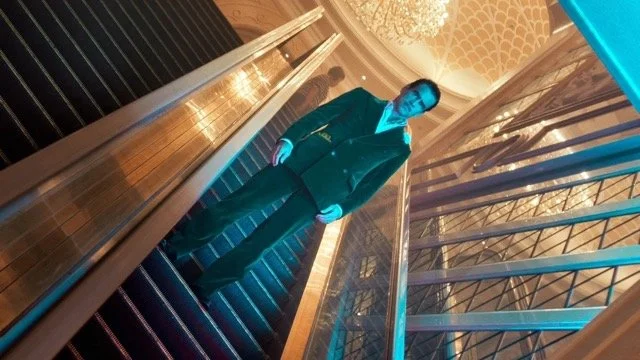Aftersun is a Subtle Stunner
One of the most thrilling aspects of moviegoing each year is stumbling upon an unexpected treasure. Sometimes these are movies from veteran filmmakers I’ve not personally encountered before; sometimes they’re brand new debuts. I hear quick, excited words out of early screenings or festivals, but never enough to entirely set my expectations. I walk into the theater eager, but open to whatever the experience may bring.
Last year, that film was Ryusuke Hamaguchi’s Drive My Car, caught in a packed screening shortly before it began picking up critics’ awards and Academy Award nominations. I left that theater shattered by strangely excited—I couldn’t wait to tell others about it. Not out of some sense of pride for being “in the know,” but out of desire to share something unbelievable and beautiful with whoever would listen.
There are many films that I’ve yet to catch up with from this year, yet I’m confident in proclaiming Aftersun as this year’s hidden treasure. (I’m hopeful that it doesn’t remain hidden for long, as it’s been topping many end of year lists.)
Charlotte Wells’ feature debut has a narrowly focused story with an existential aim. Aftersun depicts a brief holiday shared by Sophie (Frankie Corio) and her father, Calum (Paul Mescal). Sophie is right on the cusp of her teenage years, and the curiosity of her childhood is morphing into the uncertain awareness that attends early puberty. She watches older kids flirt and tease, not quite wanting to participate but eager to be seen as mature.
It’s an awkward time for anyone—feeling the instability of the world as one’s view of it shifts in frequently unintended ways.
It’s this new awareness that gently sparks a different understanding of her father. Paul Mescal’s Calum is a laid back man who connects pretty well to the energy and emotion of his preteen daughter, even though he isn’t always in the picture. As the vacation draws out, however, the picture of Calum is complicated. His love is rarely in question, but Wells gives glimpses of a reticent sadness that grows softly throughout the film.
Mescal is arresting and depicts Calum as a real person, which is a true accomplishment. It takes skill to demand an audience’s attention when playing an exaggerated figure, but it’s much trickier to do so while portraying a believable human being. (He also, for what it’s worth, plays a great dorky dad.)
Wells also breaks up the structure of the film with periodic vignettes of an adult Sophia, and we come to understand that Sophia is revisiting memories and recorded videos of this vacation, trying to stitch together these fleeting pieces of her father, pursuing an understanding of his pain.
In a much more jarring move, dark club scenes become the interstices of the story. As these gradually elongate and take shape, Sophia appears to catch glimpses of her father through the strobing crowd. I won’t go farther in describing these scenes, but what begins as a curious directorial choice builds and climaxes as one of the most potent uses of visual metaphor in recent years.
The full scope of Aftersun is like that, slowly growing from something merely interesting to a mighty emotional crest. That gradual pace is by Wells’ design, mimicking the ways we slowly arrive at a deeper understanding of our parents. Sometimes memories held for years click into place in a new way in an unexpected moment, and our whole notion of who our parents were is entirely transformed.
Wells also shows a sharp eye for innovative framing and editing, interweaving the use of home video, even incorporating it into layered shots where we watch the young Sophia film her father offscreen as his image is relayed onto a TV screen. At other times, Wells (and cinematographer Gregory Oke) leave characters partially out of frame or small enough that we feel the weight of the blank space in the frame. The characters (Calum especially) are never centered, never quite set correctly. It evokes the sense that we’re not getting the full picture of him, that he’s always a bit lost in this world.
The editing also deserves praise. It’s been a year with louder (and still very impressive) editing—look no further than Decision to Leave—but Blair McClendon’s transitions carry a tectonic impact. There’s a slow fade in Aftersun that easily stands as my favorite transition of the year, unleashing the cascade of emotion welling up within Calum. It’s as sharp a visual representation of internal struggle as any film in a very long time.
Aftersun is a subtle stunner. For a time it seems like impressive work that still gives room for one to detach from its emotive weight. But as it crests, you realize that you’ve been carried by its wave the whole time, and you can do little to prevent it from crashing upon you.



